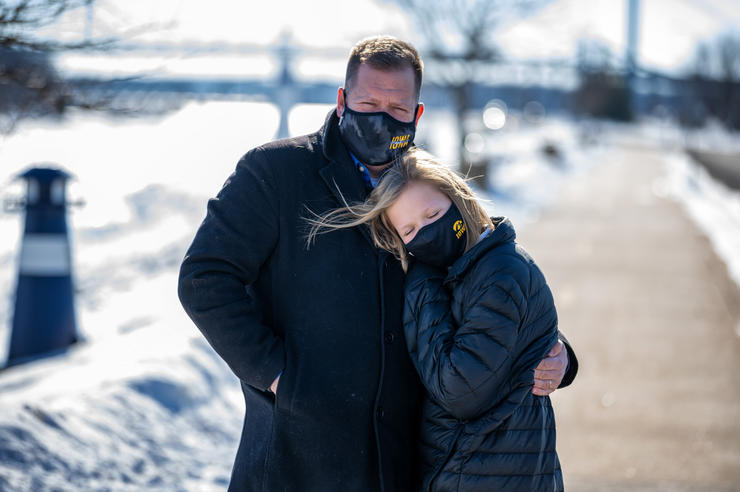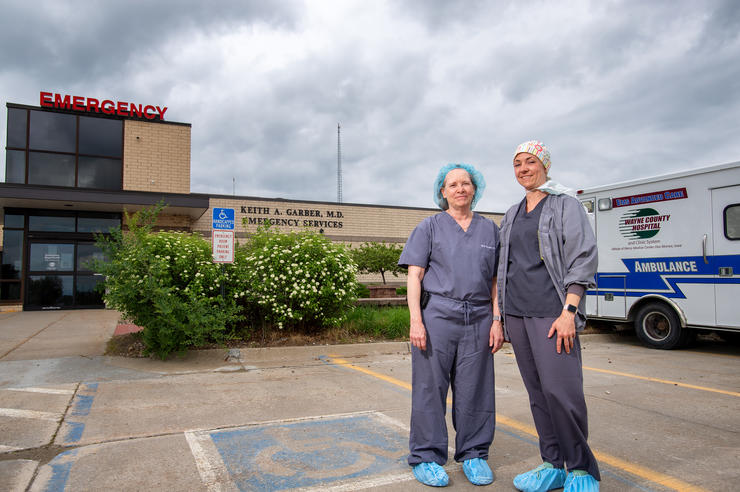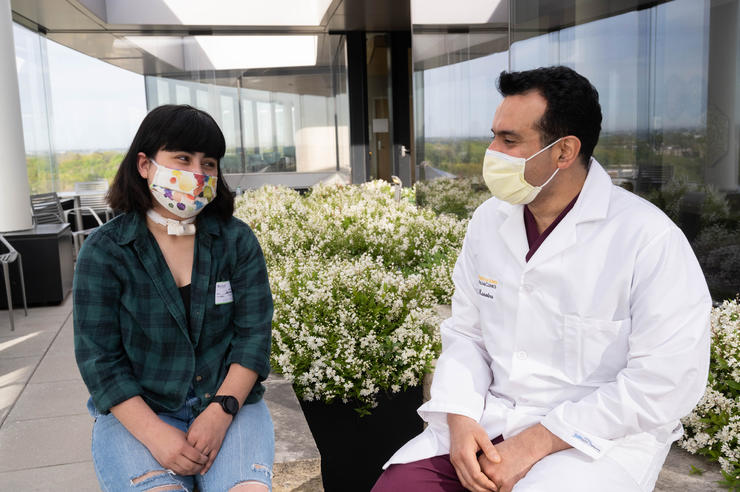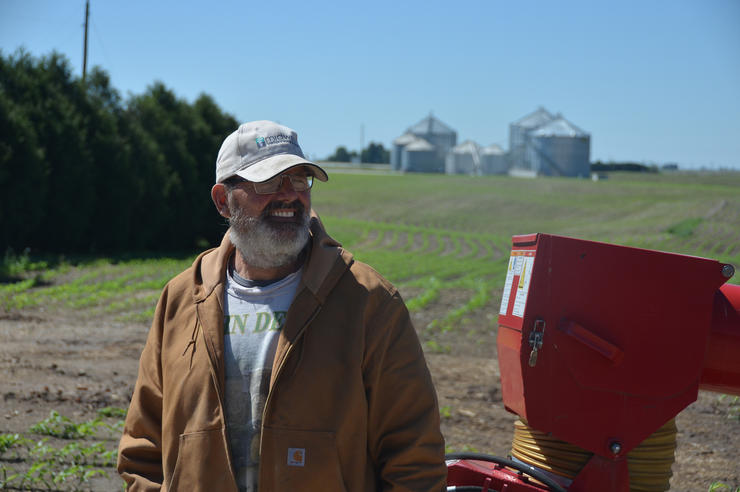Increasing care by preparing nurse practitioners
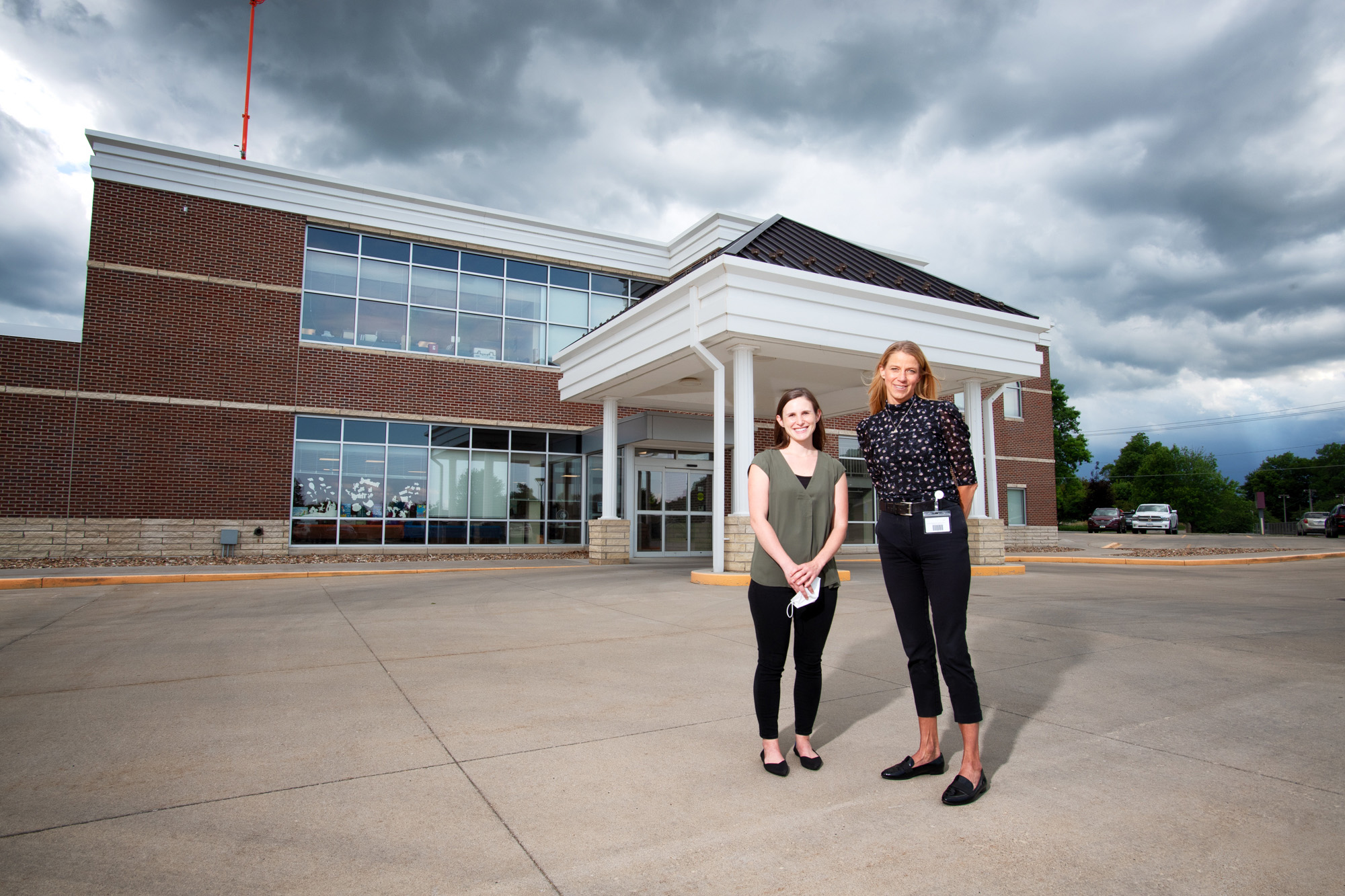
The University of Iowa College of Nursing’s nurse practitioner programs are helping to fill health care gaps in Iowa and across the country. Two recent graduates are addressing the mental health needs of Benton County residents: Samantha Jirak, who earned a DNP in 2018 with certification as a psychiatric-mental health nurse practitioner, and Bonnie Seely, a nurse practitioner who sought a postgraduate certificate in the same specialty area in 2020.
When Samantha Jirak was hired to provide psychiatric care at a family practice clinic in Benton County, Iowa, it didn’t take long for the nurse practitioner to feel overwhelmed by her caseload.
The 2018 University of Iowa graduate, who earned a Doctor of Nursing Practice (DNP) with a dual nurse practitioner certification in family and psychiatric mental health, was one of only three mental health providers in the eastern Iowa county of about 26,000 residents. That’s about one for every 8,600 people—well below the state average of one for every 700.
Determined to increase access for her patients and improve their well-being, Jirak used her advanced education and training from the UI College of Nursing to lead an expansion of services and hire a second provider. Now, each sees from five to 12 patients per day, with the most common diagnoses being anxiety, depression, ADHD, PTSD, and substance use. And yet, Jirak says, patient demand exceeds even this increased capacity.
“We’re busy—and right now we only take referrals from eight providers. I can only imagine what would happen if we were open to everyone,” Jirak says. “The fact that these limited referrals provide for two full-time behavioral health jobs says a lot.”
“Iowa’s clinical doctorate program gives graduates the ability to come to the table and present not just from a strictly clinical perspective but more on how to make systemic changes that benefit a population.”
According to the American Association of Nurse Practitioners:
- The median base salary for full-time nurse practitioners in 2020 was $110,000.
- Nurse practitioners hold prescriptive privileges in all 50 states.
- The majority of full-time nurse practitioners (59.4%) see three or more patients per hour, and write an average of 21 prescriptions per day.
With certification that allows them to examine patients, order tests, diagnose illness, prescribe medication, and provide treatment, nurse practitioners are increasingly filling health care gaps. At the UI College of Nursing, not only do aspiring nurse practitioners receive a top-notch educational and clinical experience through its DNP program, the majority of graduates—more than 80%—stay in Iowa. And by doubling admissions to most of its graduate practice programs in the past five years, the college is sending even more nursing professionals into the workforce.
The DNP curriculum, usually a three- or four-year plan of study, prepares nurses to provide holistic, patient-centered care but also to effect change through leadership, Jirak says.
“Iowa’s clinical doctorate program gives graduates the ability to come to the table and present not just from a strictly clinical perspective but more on how to make systemic changes that benefit a population,” says Jirak, who earned a BSN from Iowa in 2013 and worked as a pediatric intensive care unit nurse with UI Stead Family Children’s Hospital while in graduate school.
Nurse practitioner students at Iowa specialize in adult/gerontological acute care, adult/gerontological primary care, family, pediatric acute care, pediatric primary care, psychiatrics and mental health, or a combination of these areas. Practicing nurse practitioners who want to increase their knowledge can enroll in a postgraduate certificate program in the same specialty areas.
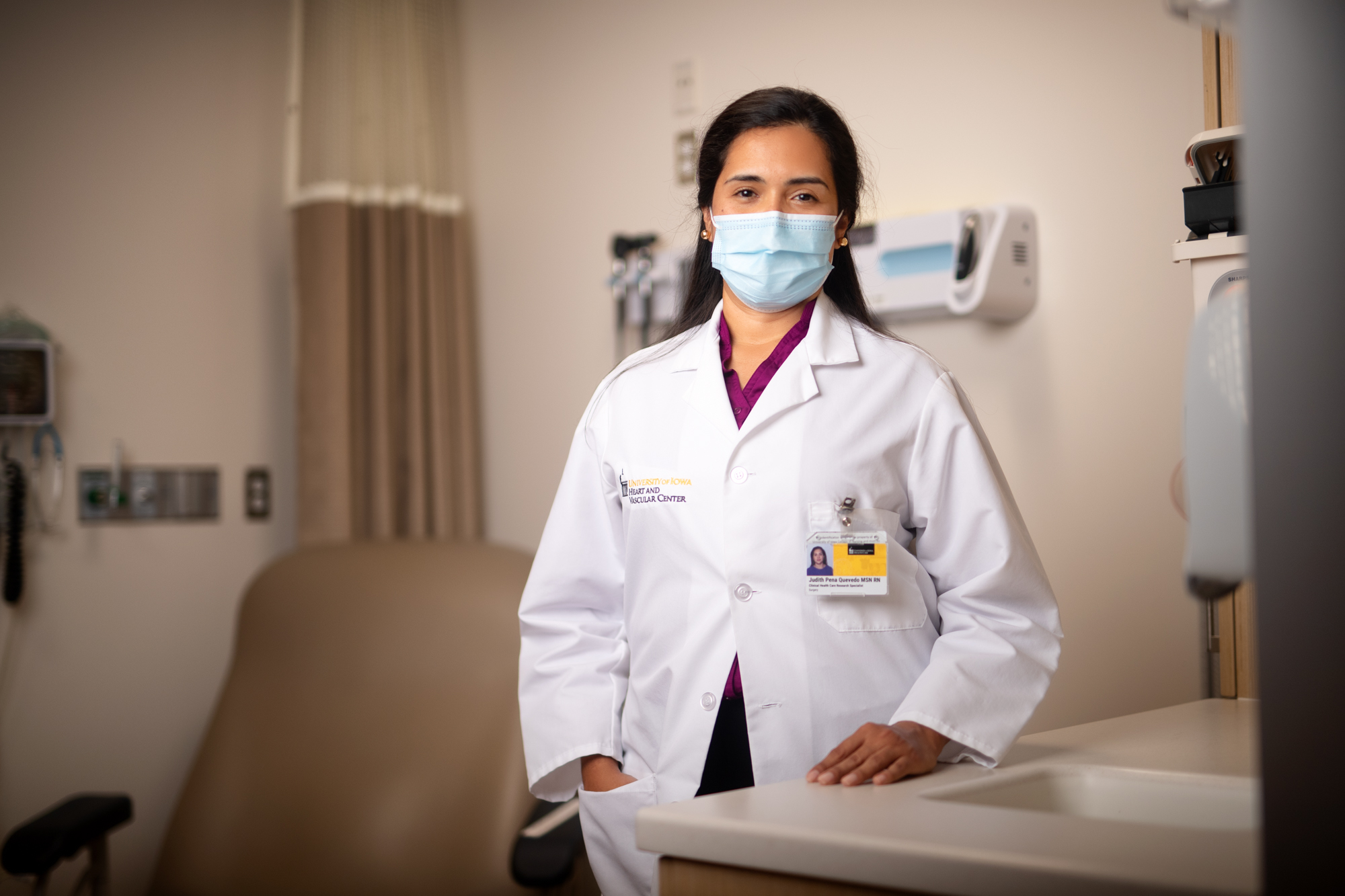
“We have it all here—professors who work closely with students, an evidence-based nursing practice model that is used worldwide, and the ability to be innovative through research.”
For Judith Peña-Quevedo, working toward a DNP with certification in adult/gerontological primary care will position her to better serve the patients she sees in the UI Heart and Vascular Center, where she works as a clinical health care research specialist and coordinates enrollment in clinical trials.
“I really enjoy working with the adult and geriatric patient population, but I see a lot of patients with gaps in their care—patients that perhaps need better management of their blood pressure or their medications—and I would like to help to close that gap,” says Peña-Quevedo, who completed undergraduate work in medical lab science in her home country of Colombia and will graduate in 2022. “I feel like the UI College of Nursing does a good job of preparing us for the real world by giving us the tools to help patients and treat them holistically. We have it all here—professors who work closely with students, an evidence-based nursing practice model that is used worldwide, and the ability to be innovative through research.”
Peña-Quevedo, who completed a master’s degree in Iowa’s clinical nurse leader program in 2011, says the DNP curriculum is demanding yet flexible. It was important to her to continue working while taking classes, many of which are available online.
The University of Iowa’s Doctor of Nursing Practice program in the College of Nursing is No. 12 in the nation, according to 2022 rankings from U.S. News & World Report.
Other UI nursing programs that received high marks include: Adult/Gerontology Primary Care (4); Adult/Gerontology Acute Care (6); Nurse Anesthesia (10); Doctor of Nursing (14); and Master of Science in Nursing (23).
Program flexibility is just one thing that sets the UI College of Nursing apart, says Mary Dirks, assistant dean for graduate practice programs. A comprehensive admission process and nationally recognized faculty members help the college maintain high rankings. Also, the college emphasizes clinical experiences and places students with practicum preceptors in a variety of settings, mostly within the state.
“We feel that it’s important for our nurse practitioner students to have a solid foundation of clinical practice, so we really concentrate on maintaining the integrity of these experiences for them,” she says, noting that many other nursing schools require students to arrange their own clinical placements. “Not only do we meet the high standards set forth by accreditation, we exceed them. For example, nurse practitioner students are required to complete at least 500 clinical hours in a specialty, but we have them complete between 630 and 1,000 clinical hours—in some cases, even more.”
In fact, preceptors often save spots for UI nurse practitioner students, with many extending job offers, Dirks adds. And the employment outlook is bright: The U.S. Bureau of Labor Statistics projects job openings for nurse practitioners to grow by 52% between 2019 and 2029. To help meet demand, the college added specialties in adult/gerontological acute care and pediatric acute care in the past five years as well as an ADN-to-DNP program.
“Ever since nurse practitioner education started more than 50 years ago, there has been increasing demand for nurse practitioners in the state and nationally,” Dirks says. “Many people find it an interesting and desirable career because of the increase in autonomy and the ability to continue working directly with patients, but also, with their advanced degree, the ability to effect change by improving outcomes for patient populations and providing leadership. It’s very fulfilling and rewarding for nurse practitioners to be able to make those positive change outcomes in their patients.”
